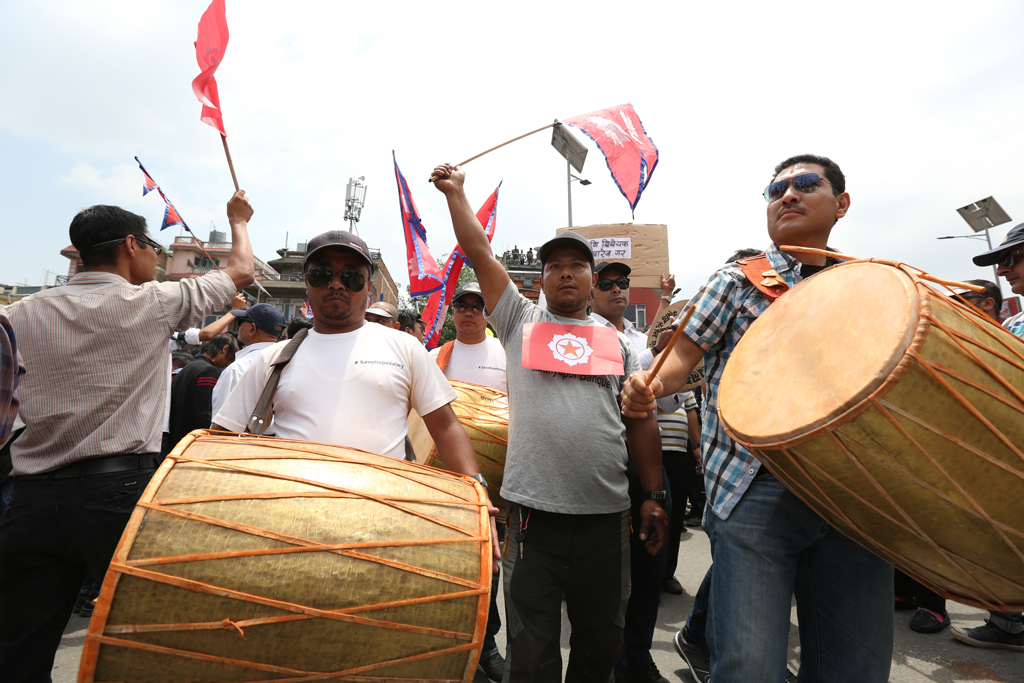The Guthi bill that was tabled by Minister of Land Management, Cooperatives and Poverty Alleviation Padma Kumari Aryal was met with strong protests, especially by the Newars of Kathmandu. The bill proposed to regulate all religious sites, nationalize both private and public guthis, and ‘better manage’ guthi lands and assets.
Following the protests, the government withdrew the bill on June 18. Still, a peaceful demonstration was staged on June 19 at Maitighar Mandala, demanding that the government scrap the bill altogether. Nardevi Guthi estimates more than 100,000 people from different ethnic groups of Nepal took part.
Among the many castes within the Newar community is Jyapu. Jyapus (“competent workers” in Newari) have rich traditions. Their pottery work and unique traditional music enrich the Newari culture. If the Guthi Bill was endorsed, Jyapu guthi operators worry, it could have vastly altered their way of life that they have preserved for generations.
Satya Narayan Dangol, 65, president of Nardevi Guthi and vice-president of Jyapu Maha Guthi, says that one reason guthis were formed, centuries ago, was to manage land used for religious and cultural purposes. Different guthis serve different purposes. There are 60 guthis in Kathmandu under Jyapu Maha Guthi, with around 200,000 members. Even under these 60 guthis, there are smaller guthis that handle different tasks. For example, under Nardevi Guthi, there are 24 guthis that have direct contact with the government for the celebration of 24 compulsory Jyapu festivals. Similarly, there are other Jyapu guthis outside Kathmandu.
Each Jyapu guthi has a unique responsibility during the celebration of festivals, including organizing bhoj (banquets). Dangol gives an example of how the festivals would have been affected had the bill passed. Jyapu Maha Guthi organizes ‘Devi Nach’ in Nardevi Chowk in Kathmandu during Ghode Jatra. This dance is performed for 36 hours straight, attracting locals and foreigners alike. The next day, Jyapus pull a chariot, taking it around the core areas of Kathmandu valley to celebrate Paanchare (Nardevi Jatra). “How would the government have managed the logistics on such a scale?” Dangol asks.
"How would the government have managed the logistics on such a scale?"
Satya Narayan Dangol President of Nardevi Guthi

Don’t need no permission
Then there are small Jyapu guthis whose only work is to provide drinking water to visitors during Rato Machhindranath Jatra in Patan. Had the Guthi bill passed, Dangol wonders if the government would have provided contractual work to serve drinks during festivals, as he is certain small guthis would have dissolved. Moreover, assets such as chariots, idols, and jewelry used in various cultural dances would have all belonged to the government. And guthi operators would have required permission to use them, which Dangol says would be unacceptable.
Like other Newar communities, Jyapus also have their own Kuladevata, Clan God, which is passed down generations and is usually owned by guthis. Dangol says that it is infuriating to think that his pious Clan God would also have belonged to the government. “I would have to seek the government’s permission to pray to my own Clan God. This reminds me of what Mao Tse-tung did in China,” he says, in what had become a common refrain of Newari protestors. Chairman Mao had launched a destructive campaign against the ‘Four Olds’—old customs, cultures, habits, and ideas—as part of the Cultural Revolution in the 1960s.
Ashish Maharjan, 26, who also hails from the Jyapu community, says, “The government has no right to touch our holy and treasured rituals and idols.”
Instead of preserving culture, Dangol says the government had been bent on trying to control guthi lands and assets. He adds that funds for the “Bahra Barse Devi Naach”, which takes place every 12 years and is organized by Nardevi Guthi, used to come directly from the Finance Ministry. He points out Jyapu Maha Guthi received Rs 200,000 for the last time in 1969 through King Mahendra. Since then, the government has refused to provide money and so the guthi operators are managing funds themselves.
Guthis, such as Sana-Guthi, Raj-Guthi, Si-Guthi, which play a vital role in keeping community spirit alive by organizing communal meals and providing solace to families who have lost a member, would have also been affected.

Suggest, don’t suppress
Dangol says Si-Guthi currently has Rs 4 million, collected by organizing a biannual bhoj. This bhoj takes place on the day of Yomari Punhi (on full-moon day in November/December) and then exactly six months later. Members have to pay a minimum amount to organize the bhoj, and any excess money they contribute goes to the Si-Guthi fund. The money is later used when someone from a family belonging to the guthi dies. Guthi operators visit the house and manage all death rituals. Dangol wonders if the government officials would have been willing to visit the families of the deceased and how they would have managed the intricate rituals.
Spokesperson of Ministry of Land Management, Cooperatives and Poverty Alleviation Janak Raj Joshi says the bill was tabled to make guthis more systematic and organized. He adds that given the widespread concern over the bill, the ministry, in any case, would take into account everyone’s concerns and interests before moving forward.
Dangol says if the ministry wanted to make guthis more systematic, it could have offered suggestions to existing guthis “instead of trying to replace a system that has been in place for generations”. The nature of guthis in Janakpur or Dang should not, he adds, influence the government’s decision on managing guthis in other regions of the country. He thinks the bill would have been more appropriate for a place like Dang, where landless peasants have worked the lands of others for generations.
But that’s not the case in Kathmandu. “Jyapus in Kathmandu have donated a lot of lands to guthis. For example, my forefathers gave some of their land to their children and the rest to various guthis,” says Dangol. He thinks that the government should solicit advice from the local governments before proposing a similar bill in the future and that each province should have a different set of laws governing guthis.
Had the bill passed, Dangol says, it would have affected not just Newar guthis, but also those of other ethnicities. Dangol adds that guthi operators should reflect on why guthis were formed in the first place and try harder to meet those needs.











